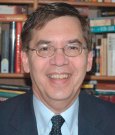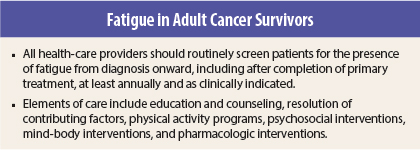A majority of cancer patients experience some level of fatigue during the course of their treatment, and approximately 30% contend with persistent fatigue for years after treatment. Fatigue is among the most common and distressing long-term effects of cancer treatment and significantly affects patient quality of life.
ASCO has adapted a pan-Canadian guideline on screening, assessment, and care of cancer-related fatigue in adults with cancer,1 the National Comprehensive Cancer Network (NCCN) Guideline for Cancer-Related Fatigue,2 and the NCCN Guidelines for Survivorship3 for use in the screening, assessment, and management of fatigue in adult survivors of cancer.
The adapted guideline, reported in the Journal of Clinical Oncology,4 applies to cancer survivors diagnosed at age ≥ 18 years who have completed primary cancer treatment with curative intent and are in clinical remission off therapy as well as to patients who are disease-free and have gone on to maintenance or prophylactic therapy. The guideline targets health-care professionals including medical, surgical, and radiation oncologists, psychosocial and rehabilitation professionals, primary care providers, nurses, and others involved in care for survivors, as well as patients, family members, and caregivers of patients who have survived cancer.
The pan-Canadian and NCCN guidelines underwent methodologic review by ASCO guideline staff members and content review by an ASCO ad hoc panel, including multidisciplinary representation with guidance from an advisory group. Julienne E. Bower, PhD, of the University of California, Los Angeles, and Paul Jacobsen, PhD, of H. Lee Moffitt Cancer Center and Research Institute, Tampa, Florida, were the co-chairs of the ASCO Expert Panel.
The primary guideline question was: “What are the screening, assessment, and treatment approaches to the management of adult cancer survivors who are experiencing symptoms of fatigue after completion of primary treatment?” A summary of the adapted guideline recommendations follows.
Screening
All health-care providers should routinely screen patients for the presence of fatigue from diagnosis onward, including after completion of primary treatment. All patients should be screened for fatigue as clinically indicated and at least annually. Screening should be performed and documented using a quantitative or semiquantitative assessment. The adapted guideline includes a list of instruments that can be used.
Comprehensive, Focused Assessment
Assessments should be a shared responsibility of a clinical team.
History and Physical: A focused fatigue history should be performed, disease status evaluated, and treatable contributing factors assessed. The clinical team must decide together when referral should be made to an appropriately trained professional (eg, cardiologist, endocrinologist, mental health professional, internist).
Laboratory Evaluation: Laboratory evaluation should be considered based on presence of other symptoms and onset and severity of fatigue.
Treatment and Care Options
Education and Counseling: All patients should be offered specific education about fatigue after treatment (eg, information about the difference between normal and cancer-related fatigue, persistence of fatigue after treatment, and causes and contributing factors). Patients should be offered advice on general strategies to help manage fatigue. Patients treated for fatigue should be observed and re-evaluated on a regular basis to determine whether treatment is effective.
Contributing Factors: All medical and treatable contributing factors should be addressed, including pain, depression, anxiety, emotional distress, sleep disturbance, nutritional deficit, activity level, anemia, medication adverse effects, and comorbidities.
Physical Activity: Initiating/maintaining adequate levels of physical activity can reduce cancer-related fatigue after cancer treatment. All patients should be encouraged to engage in a moderate level of physical activity after treatment—eg, 150 minutes of moderate aerobic exercise (eg, fast walking, cycling, or swimming) per week with an additional two to three strength training (eg, weight lifting) sessions per week, unless contraindicated. Walking programs are generally safe for most cancer survivors. The American College of Sports Medicine recommends that cancer survivors can begin this type of program after consulting with their physician but without any formal exercise testing (such as a stress test).
Survivors at higher risk of injury (eg, those with neuropathy, cardiomyopathy, or other long-term effects of therapy) and patients with severe fatigue interfering with function should be referred to a physical therapist or exercise specialist. Breast cancer survivors with lymphedema should also consider meeting with an exercise specialist before starting upper-body strength training.
Psychosocial Interventions: Cognitive behavioral therapy/behavioral therapy and psychoeducational therapy/educational therapy can reduce cancer-related fatigue in survivors. Survivors should be referred to psychosocial service providers who specialize in cancer and are trained in empirically based interventions. Psychosocial resources for fatigue may also be available through the National Cancer Institute and other organizations.
Mind-Body Interventions: There is some evidence that mindfulness-based approaches, yoga, and acupuncture may reduce fatigue in cancer survivors. Additional research, particularly in the post-treatment population, is needed for biofield therapies (touch therapy), massage, music therapy, relaxation, reiki, and qigong. Survivors should be referred to practitioners who specialize in cancer and who use protocols that have been validated in cancer survivors.
Pharmacologic Interventions: There is evidence that psychostimulants (eg, methylphenidate) and other wakefulness agents (eg, modafinil) can be effective in managing fatigue in patients with advanced disease or those receiving active treatment. There is limited evidence of effectiveness in reducing fatigue in patients who are disease-free after active treatment. Small pilot studies have evaluated the impact of such supplements as ginseng and vitamin D on cancer-related fatigue, but as yet, there is no consistent evidence of the effectiveness of these or other supplements. n
The panel stated:
“Fatigue is prevalent in cancer survivors and often causes significant disruption in functioning and quality of life. Regular screening, assessment, and education and appropriate treatment of fatigue are important in managing this distressing symptom. Given the multiple factors contributing to post-treatment fatigue, interventions should be tailored to each patient’s specific needs. In particular, a number of nonpharmacologic treatment approaches have demonstrated efficacy in cancer survivors.” ■
References
1. Howell D, Keller-Olaman S, Oliver TK, et al: A pan-Canadian practice guideline and algorithm: screening, assessment and supportive care of adults with cancer-related fatigue. Curr Oncol 20:e233-e246, 2013.
2. National Comprehensive Cancer Network: NCCN Clinical Practice Guidelines in Oncology: Cancer-Related Fatigue (version 1.2013). Available at www.nccn.org.
3. National Comprehensive Cancer Network: NCCN Clinical Practice Guidelines in Oncology: Survivorship (version 1.2013). Available at www.nccn.org.
4. Bower JE, Bak K, Berger A, et al: Screening, assessment, and management of fatigue in adult survivors of cancer: An American Society of Clinical Oncology Clinical Practice Guideline Adaptation. J Clin Oncol. April 14, 2014 (early release online).




